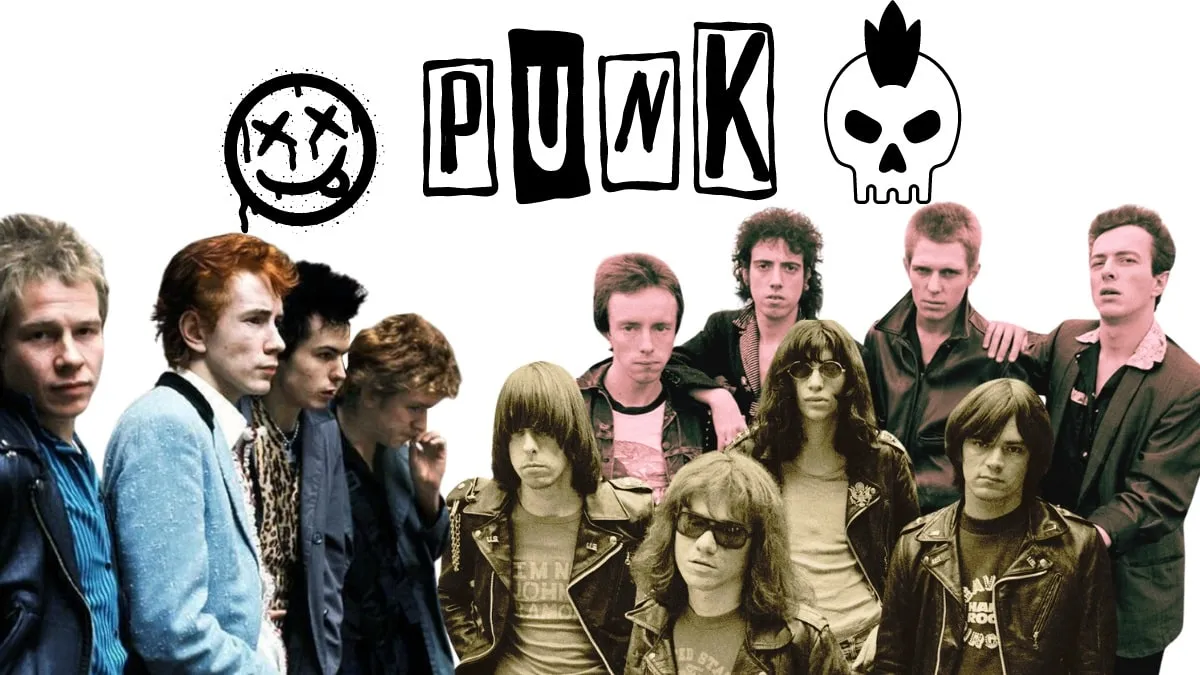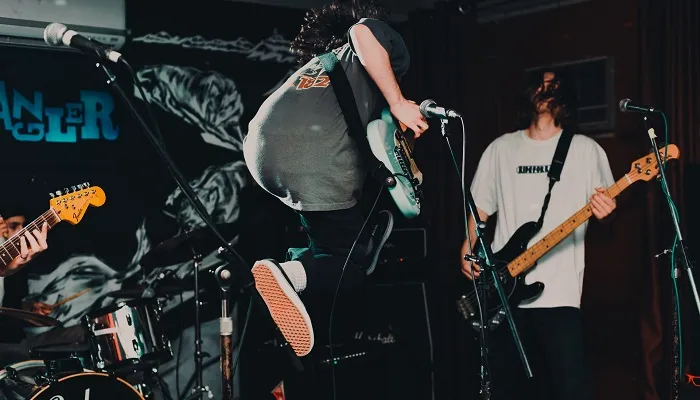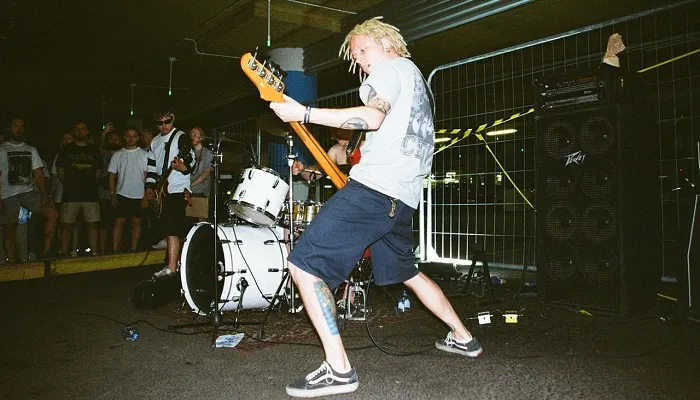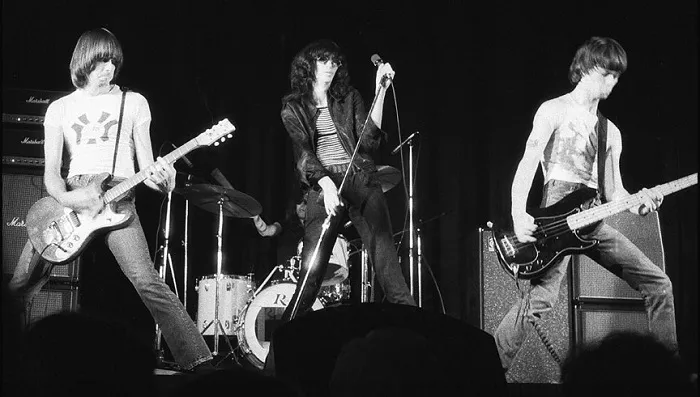Punk rock isn’t something you grow out of. Punk rock is an attitude, and the essence of that attitude is “Give us some truth!” – Joe Strummer, the Clash
Hostile towards many of the societal norms, questioning everything, and pushing towards living freely with no boundaries, are a few ways to describe that “punk” attitude embraced by the outcasts who produced punk music in the 70s, and the music scene hasn’t been the same ever since.
What Is Punk Music?
In its most basic definition, Punk music is a manifestation of the rebellious, anti-authority punk subculture that peaked in the second half of the 1970s, primarily in the US and the UK.
Not just a music genre, but punk is more of an attitude, a philosophy, and a whole way of being. Punk music is loud, aggressive, a bit distorted, and stripped to its essence.
How Did It All Start?
The question, “Where did Punk originate?” has multiple controversial answers, given the underground, independent nature of punk. Punk was built against something rather than ‘born’ out of thin air, and it was nowhere near a systematic development.
Yet, I’ll try to focus on two threads that were forming the origins of Punk music nearly at the same time in the US and the UK.
The Undisputed Birthplace of Punk Rock
It’s the 1970s; the mainstream music scene is dominated by Disco and Rock, especially hard rock. We’re taking David Bowie, Pink Floyd, Bee Gees, and Aerosmith, to mention a few.
At that time, it wasn’t easy for an artist or a band who can’t mold their music into the prevailing counterculture to find a place in the music scene. Without being aware of it, multiple musicians, or musician wannabes to be precise, started producing a different kind of rock music in garages; messier, amateurish, and more distorted.
The incohesive, unplanned garage rock movement dates back to the 1960s in Manhattan, and retrospectively, it was given the name “Protopunk” or “Garage Rock.” The theory that traces punk music back to garage rock in New York is widely acceptable, given the rise of bands like Television, Misfits, Ramones, Blondies, and Talking Heads there, particularly in the famous CBGB club, known as the ‘undisputed birthplace of punk rock.’
Malcolm McLaren – The British Version
On another note, Malcolm McLaren has helped import the new musical genre to Britain. In this period, the late economic recession has catalyzed the upsurge of punk in the UK, where it had a more political nature than its parallel in the US.
Sex Pistols were at the front of the English punk music scene, with ideas critiquing the whole music industry and the prevailing consumerism clearly present in their debut single, ‘Anarchy in the UK.’ However, this band was just laying the foundation for some solid British punk bands.
The anti-authoritarian nature of punk deems it local, given that it’s usually resisting something in its own environment. We recall the emerging 70’s punk rock scene in London, the 90’s Berlin punk, and the 00’s punk of Tokyo. Add to that the fact that punk’s only rule is “follow no rules,” and you’ll get various punk styles depending on the time and location you’re talking about!
What Does Punk Music Sound Like?
There’s a famous saying that describes what punk music sounds like. It says that it uses the guitar as white noise, drums as texture, and vocals as hostile slogans. As poetic as this might seem, it’s actually quite precise.
Technically speaking, punk songs are usually short and fast-paced. Lyrics are far from being conservative but rather aggressive and provocative with a dash of anti-establishment and anarchy shouts every now and then.
Musically
While early punk bands embraced the standard 4/4 time signature of rock and roll, they broke this format later, favoring messier and ‘crazier’ sounds, if I might say. The emphasis was rather on beats 2 and 4.
As the saying goes, the guitar is used as ‘white noise’ thanks to the highly distorted power chords. In fact, punk is anti-apathetic to guitar solos that might indicate some self-indulgence of the soloist, which is against the core principles of punk.
Bass guitar provides basic repetitive lines that sometimes felt forced, contributing to the overall chaotic soul of punk. Drums have a minimal setup with dry, unadorned beats.
Lyrically
Attacking the mainstream and maybe even shocking it both lyrically and musically were among the goals of British punk music in the early 70s. Lyrics were confrontational, and they addressed political and social issues bluntly.
Sex Pistols “God save the queen” encapsulates this perfectly with a verse that goes like this:
God Save the queen
The fascist regime
They made you a moron
A potential H bomb
The song was banned from the BBC and nearly every other radio station in Britain at the time!
The DIY Punk Approach
Punk is intended to sound unrefined and somehow low production; part of that is because of its stance against the industry’s benefactors. The DIY spirit is glorified in punk culture, especially in the UK, where pub rock became a thing around 1972. Bands started to look for low-budget, small venues where they can play, so they mostly played in small pubs. Hence, the name ‘pub rock.’
The idea of independently producing records was a thing back then. Stiff records are a good example of that.
They used to self-produce and rely on small, independent record labels to distribute them. The whole punk scene was connected through the DIY press and small venues network in a strong stance against the status quo.
The Punk Rock Hall of Fame
What’s a better way to get a good grip on a music genre than listening to it?
Here are three punk rock bands that’ll set you up with the punk vibe and get you going!
Ramones – The Cursed Band
Arguably one of the most famous and influential bands in punk rock history, the Ramones did create that punk prototype both musically and stylistically. Four adolescents in torn blue jeans and leather motorcycle jackets traveled around the US in a small van and performed in small venues playing punk music as it should be; raw, aggressive, and angsty.
Despite all that, Ramones didn’t have a single hit song, and they broke up in 1996, 20 years after their debut album, Ramones, mainly due to some personal tragedies of the band’s members. Yet, their music has helped shape the punk genre and inspired multiple bands afterward.
The Sex Pistols – Inspiring and Notorious
If you’re thinking about punk rock in the sense of refusing to submit to social norms and revolting against the status quo, then Sex Pistols are the embodiment of that.
The band was formed in London in 1975 by Malcolm McLaren, who owned a fashion shop named SEX. The band started out as a marketing tool for it, and then they embarked on a long journey of successful small gigs across London.
It wasn’t until they were called on for a TV appearance with Bill Grundy as a substitution for Queen that they went viral because of some obscene talk, especially by their guitarist, Steve Jones.
Mclaren had big ambitions for the band, and he tried his best to get them there. He never looked at them as musicians only. He always had their attitude, fashion style, and even obscenity in mind when he presented them.
“Do you realize these kids didn’t buy the records for the music? If that was the case, this thing would have died a death years ago.” He admits in the documentary, The Great Rock ‘n’ Roll Swindle.
The Clash – Idealistic Punk Rockers
As opposed to Sex Pistols, the Clash embraced the idealistic leftist approach to punk. During their seven-year run, they managed to produce some of the most significant records in punk and rock history.
Their debut album was titled The Clash, and it got them to the UK Top 20 in 1976. They took a more experimental approach in 1979 with their album, London Calling, which was warmly welcomed in the US and was claimed to be their best work by the Rolling Stones later on.
Cool Fact: The Clash performed their first gig in a Sex Pistols concert in London, the summer of 1976!
The End of Punk
Did punk music end?
Well, yes, and pretty prematurely, actually.
Punk’s popularity was the reason for its short lifespan. Original punk was dead by 1976 when it became an overground phenomenon instead of a rebellious underground movement.
Members of punk bands who were not necessarily professional musicians but angry outcasts brought up in harsh environments and channeling their anger in their music has gone popular in a couple of years. They were performing everywhere and on tour the whole time, which eventually provided them with money and fame, which changed their initial state. The reality is that you can’t be angry all the time and let your music rely on it.
Despite that, punk subgenres continued until today. The Oi! subgenre originated in the 80s in the UK, and from there, multiple postpunk genres emerged, most notably hard punk and pop-punk. Two of the most memorable bands that contributed to the punk music revival in the US in the 90s are Green Day and Rancid.












1 comment
This is a good introduction to the history and spirit of punk with depth, clarity and good language style.